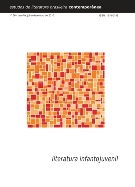Poéticas do dilaceramento e da desolação:
Bernardo Carvalho e Sergio Chejfec
Abstract
Este trabalho consiste em uma análise de como as narrativas contemporânea brasileira e argentina, especifi camente os romances Teatro (1998), do escritor brasileiro Bernardo Carvalho, e Los incompletos (2004), do argentino Sergio Chejfec, fi ccionalizam diferentes poéticas da experiência contemporânea, com ênfase principalmente na impossibilidade e nos obstáculos em transformar o momento vivido em matéria narrativa.
Downloads
References
AGAMBEM, Giorgio (2006). Homo Sacer. El poder soberano y la nuda vida. Valencia: Pre-textos.
_______ (2007). Infancia e historia. Buenos Aires: Adriana Hidalgo.
BENJAMIN, Walter (1994). “Experiência e Pobreza”; “O narrador”; “Sobre o conceito de História”. In: Magia e técnica, arte e política: ensaios sobre literatura e história da cultura. Obras Escolhidas. São Paulo: Brasiliense. v. 1.
CARVALHO, Bernardo (1998). Teatro. São Paulo: Companhia das Letras.
CHEJFEC, Sergio (2004). Los incompletos. Buenos Aires: Alfaguara.
LOWY, Michel (1990). “Walter Benjamin crítico do progresso: Ã procura da experiência perdida.” In: _____. Romantismo e messianismo. São Paulo: Perspectiva/Edusp.
PENNA, João Camilo (2006). “Sobre viver no lugar de quem falamos (Giorgio Agamben e Primo Levi)”. In: SELIGMANN-SILVA (Org.). Palavra e imagem, memória e escrita. Chapecó: Argos. p. 127-84.
Downloads
Published
How to Cite
Issue
Section
License
Authors who publish in this journal agree to the following terms:
a) The authors maintain the copyright and grant the journal the right of first publication, the work being simultaneously licensed under the Creative Commons Attribution License-Non Commercial 4.0 which allows the sharing of the work with acknowledgment of the authorship of the work and publication this journal.
b) Authors are authorized to enter into additional contracts separately, for non-exclusive distribution of the version of the work published in this journal (eg publish in institutional repository or as a book chapter), with authorship recognition and publication in this journal.
c) Authors are allowed and encouraged to publish and distribute their work online (eg in institutional repositories or on their personal page) after the editorial process, as this can generate productive changes, as well as increase the impact and citation of published work (See The Effect of Free Access).
d) The authors of the approved works authorize the magazine to, after publication, transfer its content for reproduction in content crawlers, virtual libraries and the like.
e) The authors assume that the texts submitted to the publication are of their original creation, being fully responsible for their content in the event of possible opposition by third parties.


